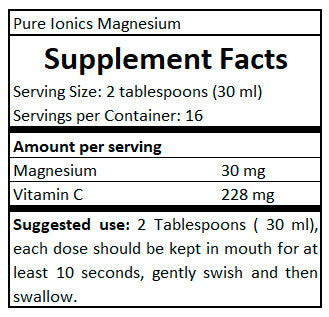Amazonas Natural Treatments
Pure Ionics Magnesium 480 ml / 16 oz liquid
Pure Ionics Magnesium 480 ml / 16 oz liquid
Couldn't load pickup availability
Magnesium is an essential mineral that plays many important roles in the body. Its chief function is to activate certain enzymes, especially those related to carbohydrate metabolism. Another role is to maintain the electrical potential across nerve and muscle membranes. It is essential for proper heartbeat and nerve transmission.
Despite its importance, many people suffer from magnesium deficiency, with an estimated 90-95% of the population being deficient. Symptoms of magnesium deficiency can vary widely and can include muscle cramps, anxiety, spasms, fatigue, headaches, irritability, sleep disorders, low energy, body tension, backaches, heart disorders, PMS, muscle tension, kidney stones, osteoporosis, depression, irregular heartbeat, insomnia, and others too numerous to mention.
Magnesium is the most important mineral in the body because it activates over 300 processes in the body. These functions include energy production, muscle function, digestion, creation of new cells, bone formation, relaxation of muscles, the functioning of your heart, kidneys, the activation of B vitamins, adrenals, brain and nervous system. Deficiency of magnesium, to any extent, will interfere with any of these factors.
It is important to ensure that your body gets enough magnesium to support these vital functions. Magnesium-rich foods include leafy green vegetables, nuts and seeds, whole grains, and fish. However, for many people, it can be challenging to get enough magnesium through diet alone.
That's where magnesium supplements come in. Taking a high-quality magnesium supplement can help ensure that your body gets the magnesium it needs to function properly. However, it is important to choose a supplement that is safe and effective.
| Suggested Use | |
| 2 Tablespoons ( 30 ml), each dose should be kept in mouth for at least 10 seconds, gently swish and then swallow. |
Share






